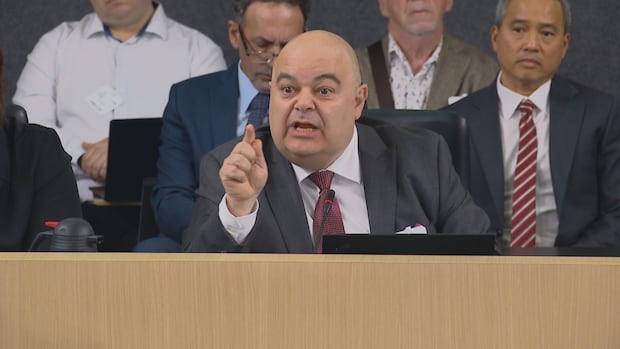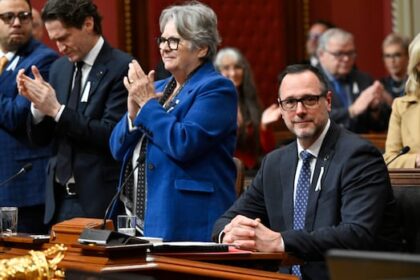MontrealFamily doctors and medical specialists have been negotiating with Quebec, with Bill 106 at the heart of tensions. The bill, among other things, would link the pay of physicians to performance indicators in an effort to get them to take on more patients. Negotiations with medical specialists also at standstill, mediation suspendedCBC News · Posted: Oct 16, 2025 10:27 AM EDT | Last Updated: 5 hours agoOn Thursday, Dr. Marc-André Amyot, president of the Quebec group representing family doctors, said despite physicians’ ‘enormous efforts’ at the bargaining table, the government wasn’t budging. (Radio-Canada)As of Thursday, Quebec family doctors are no longer teaching their medical students and medical specialists have announced the suspension of mediation as negotiations with the provincial government are at an impasse. Family doctors and medical specialists have been negotiating with Quebec, with Bill 106 at the heart of tensions. The bill, among other things, would link the pay of physicians to performance indicators in an effort to get them to take on more patients.Last month, members of the Fédération des médecins spécialistes du Québec (FMSQ), which represents medical specialists in the province, stopped teaching undergraduate students and supervising their clinical placements in protest of the bill. And on Thursday, the Fédération des médecins omnipraticiens du Québec (FMOQ), the group representing family doctors, followed suit.”The FMOQ had agreed in good faith to postpone the teaching boycott,” the federation wrote in a statement to Radio-Canada on Wednesday. “In light of the government’s intransigence, the boycott will go ahead as planned.” The FMOQ is now requesting arbitration to settle this dispute. The group says it is committed to respecting the results of this arbitration, whatever the implications may be. Meanwhile, negotiations with medical specialists also remain at a standstill.On Thursday, the FMSQ announced the suspension of mediation.In a letter to its members obtained by Radio-Canada, the president of the FMSQ, Dr. Vincent Oliva, said negotiations would only resume if “the government confirms that its negotiators at the table have a mandate to move forward without interference from the chief gravedigger of the negotiations, minister Dubé.””We have made it clear to our counterparts that we will no longer play in this bad movie that always ends the same way,” wrote Oliva.On Oct. 20, the FMSQ is expected to examine ‘phase two’ of the pressure tactics, where new actions will be on the agenda.’We are still willing to negotiate,’ says governmentIn a joint statement to Radio-Canada, Health Minister Christian Dubé and Treasury Board President France-Élaine Duranceau expressed their disappointment with the FMOQ’s decision. “We had put commitments for family medicine groups on the table. We are still willing to negotiate. Our goal remains that all Quebecers be cared for by a family doctor or a clinic,” wrote Dubé and Duranceau.In an interview on Radio-Canada’s Tout un matin Thursday morning, Dr. Marc-André Amyot, president of the FMOQ, accused the government of negotiating in “bad faith,” saying it refused to budge, despite “enormous efforts” made by doctors at the bargaining table. “The minister says we are the highest paid in Canada. Well, if that’s true, let him prove it to the arbitrator and we’ll accept a pay cut,” said Amyot.He said his group has put forth solutions at the bargaining table, offering more appointment slots for patients and said it would like to work with the government to reach an agreement on a new remuneration scheme.Last month, Health Minister Christian Dubé told reporters that Bill 106 is sticking around. (Sylvain Roy Roussel/CBC)Dubé said last month that Bill 106 is here to stay, even if an agreement is reached with family doctors and medical specialists. Now, many medical students across the province worry they may not graduate in June because of this dispute. Bill 106 proposes a mixed remuneration model, which includes capitation payments — an annual flat rate per patient based on their vulnerability level — an hourly rate for time spent with patients and a fee-for-service.Part of their pay would also be linked to their collective performance based on targets set at the provincial and local levels.These targets could reduce wait times and absenteeism rates, and increase quality of care, said Dubé in May.Amyot has warned that the bill will have a negative impact on access to doctors and stated that the evaluation of family doctors’ work shouldn’t be based solely on their clinical appointments, as there’s a “whole lesser-known section of their work.”Written by Hénia Ould-Hammou, with files from Cassandra Yanez-Leyton and Radio-Canada
Thursday, 5 Mar 2026
Canada – The Illusion
Search
Have an existing account?
Sign In
© 2022 Foxiz News Network. Ruby Design Company. All Rights Reserved.
You May also Like
- More News:
- history
- Standing Bear Network
- John Gonzalez
- ᐊᔭᐦᑊ ayahp — It happened
- Creation
- Beneath the Water
- Olympic gold medal
- Jim Thorpe
- type O blood
- the bringer of life
- Raven
- Wás’agi
- NoiseCat
- 'Sugarcane'
- The rivers still sing
- ᑲᓂᐸᐏᐟ ᒪᐢᑿ
- ᐅᑳᐤ okâw — We remember
- ᐊᓂᓈᐯᐃᐧᐣ aninâpêwin — Truth
- This is what it means to be human.
- Nokoma











